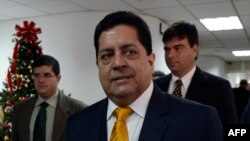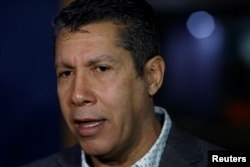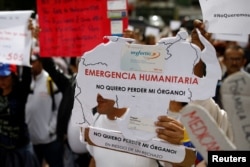Venezuela's major opposition groups edged closer Tuesday to an all-out boycott of an upcoming presidential election, warning the vote wouldn't be free or fair.
In a further potential blow to the opposition, a senior official in the ruling socialist party proposed early elections for Venezuela's opposition-controlled congress as well, cutting its term short by more than a year.
Opposition lawmaker Edgar Zambrano told The Associated Press that his Democratic Action party and two other movements had decided to boycott. In all, four major opposition parties have decided they won't run a candidate against President Nicolas Maduro.
It remained unclear whether the entire coalition of opposition candidates would sit out April 22's presidential election in protest. Some have warned that abstention would be a mistake, ceding power to Maduro unchallenged for another six-year term.
The Democratic Unity alliance, made up of some 20 parties, has yet to take a position.
"This election is winnable," said economist Francisco Rodriguez, an adviser to potential opposition candidate Henri Falcon, who was believed to be still considering an independent run but declined to make an announcement Tuesday. "There is really no alternative for the opposition."
The boycotting opposition parties have said that participation lends legitimacy to a fraudulent process.
Collapse of talks
The latest boycott decision came days after talks between the government and opposition in the Dominican Republic centered on the elections collapsed.
Falcon, a former governor and onetime aide to the late President Hugo Chavez, said Tuesday that boycott plans were still being discussed among the coalition members. The opposition will continue to fight for transparent election conditions, he said.
Rodriguez, a Venezuelan and a senior economist at the New York-based Torino Capital investment firm, also declined to comment on Falcon's potential candidacy but said the boycott would be a mistake.
The election comes at a critical moment for Venezuela, an oil-rich country in the throes of an economic crisis with shortages of food and medicine.
Maduro, the handpicked successor to the late Chavez, has low approval ratings, but he's managed to keep his political opponents at bay.
Venezuela's socialist party chief Diosdado Cabello said in a radio interview on Tuesday that he proposed holding early elections for members of the country's National Assembly as well.
He said the opposition-controlled congress should be elected on April 22, the same day as presidential vote, cutting short the five-year terms of members elected in 2015.
Maduro's administration in 2017 consolidated power by forming a constituent national assembly, which was given nearly unlimited power and has usurped the National Assembly's powers.
The United States and other countries have condemned the constituent assembly as being undemocratically formed and have also criticized the way early presidential elections were called.
"Legislative power does not exist here in Venezuela," Cabello said of the National Assembly, comparing it to a "dinosaur."






